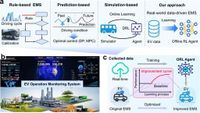A study introduces a real-world data-driven energy management framework utilizing offline reinforcement learning to optimize electric vehicle performance and enhance energy efficiency against traditional methods.
The study presents a data-driven framework using offline reinforcement learning (ORL) for energy management in electric vehicles, improving performance and optimizing energy consumption while eliminating manual rule design.
The research is conducted by a team involving various affiliations, with data collected from an electric vehicle monitoring system in China.
The findings were discussed in the context of recent advancements in electric vehicle technology, although specific publication dates are not given in the abstract.
The study utilizes data from real-world operation in China, focusing on fuel cell electric vehicles (FCEV).
The need for enhanced energy management systems in electric vehicles arises from the industry's transformation towards sustainability and efficiency in response to environmental challenges.
Methodologies include leveraging historical operation data and utilizing machine learning techniques, particularly offline reinforcement learning, to improve energy management without the need for extensive expert knowledge or simulation.
The ORL method was trained on datasets comprising over 60 million kilometers of driving data, demonstrating significant performance improvements with increased data availability.
"The method is tested on fuel cell electric vehicles, optimizing energy consumption and reducing system degradation."
"Notably, with increasing data availability, performance improves significantly, from 88% to 98.6% of the theoretical optimum after two updates."
This innovative approach marks a milestone in optimizing electric vehicle energy management systems by moving away from traditional static methods to a model that continuously learns and adapts.
In recent years, electric vehicles (EVs) have gained immense traction across the globe, with sales figures underscoring their rapid adoption. For example, EV manufacturer BYD reported sales of 3.02 million EVs in 2023. Hybrid energy systems (HES) within EVs, which incorporate multiple energy sources—like batteries and fuel cells—are central to improving efficiency and reliability.
Despite advancements, energy management systems (EMS) have traditionally relied on manual rule-based strategies, which pose issues of rigidity and adaptability. This new study emphasizes a paradigm shift with the introduction of the ORL framework, which harnesses large datasets to learn optimal energy management strategies dynamically.
The development of this framework involved collecting real-time operational data from an extensive EV monitoring system in China. With over 60 million kilometers of driving data harnessed, the researchers aimed to develop an energy management strategy that optimizes energy consumption while reducing system degradation.
By employing offline reinforcement learning, the proposed approach moves beyond the limitations of simulation-based learning systems. This method effectively handles real-world conditions and dynamically adapts to varied driving scenarios without needing extensively designed models or expert rules.
Testing revealed that the ORL framework consistently achieved superior performance results, reflecting energy optimization under various conditions. Notably, the study showcased that performance scalability led to significantly improved operational efficiency as data availability increased, reinforcing the framework’s practical applicability in real EV applications.
This advancement not only holds promise for enhancing vehicle lifespan but also aligns with broader sustainability goals. In leveraging historical data, this innovative EMS approach highlights the unprecedented potential of data-driven frameworks in the energy management landscape. As researchers continue refining methodologies, the implications could extend far beyond just electric vehicles, shaping energy management practices across industries.
In summary, the introduction of the ORL framework signals a transformative shift in how energy management systems operate, with implications reaching well across the automotive sector and potentially influencing broader energy management practices in various fields.

